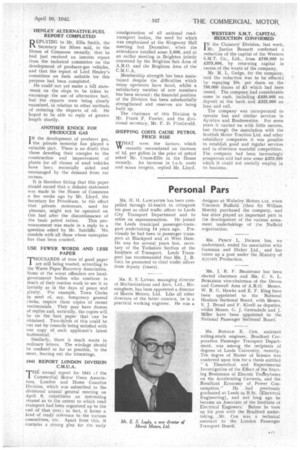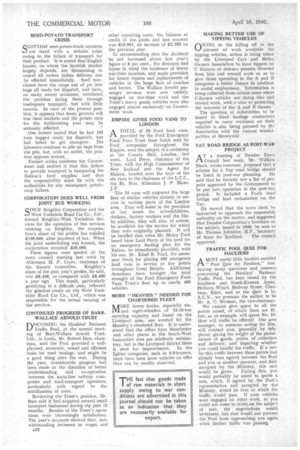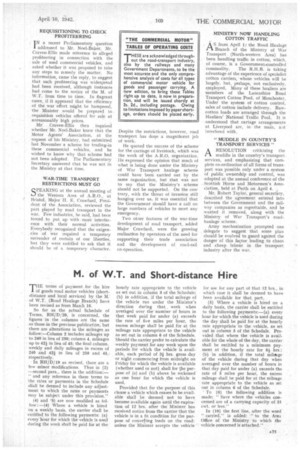Personal Pars
Page 23

Page 24

Page 25

If you've noticed an error in this article please click here to report it so we can fix it.
MR. H. H. LANCASTER has been Compelled through ill-health to relinquish his post as chief traffic officer in Leeds City Transport Department and to
retire on superannuation. He joined the Leeds municipal passenger-transport undertaking 14 years ago. Previously he had been in passenger transport at Blackpool and at West Ham. He was for several years hon. secretary of the Yorkshire Section of the Institute of Transport. Leeds Transport has recoMmended that MR. J. B. GILL be promoted to chief traffic officer from deputy (buses).
MR. E. S. LUYKS, managing director of Mechanizations and Aero, Ltd., Birmingham, has been appointed a director of Morris Motors, Ltd. Like all other directors of the latter concern, he is a practical working engineer. He was a designer at Wolseley Motors Ltd. when Viscount Nuffield (then Sir William Morris) purchased the company, and has since played an important part in the development of the various armament undertakings of the Nuffield organization.
MR. PERCY L. DICKER has, we understand, ended his association with Gamman and Dicker Ltd., and has taken up a post under the Ministry of Aircraft Production.
MR. J. R. F. BRADFORD has been elected chairman and Ma. C. S. L. BURLEIGH vice-chairman of the Devon and Cornwall Area of A.R.O. Messrs. W. R. G. Hawke and E. F. King have been appointed to the National Hauliers Sectional Board, with Messrs. S. J, Broad and F. Kivell as deputies, whilst Messrs. G. J. Greenslade and J. Miller have been appointed to the National Passenger Sectional Board.
MR. RONALD E. Cox, assistant rolling-stock engineer, Bradford Corporation Passenger Transport 'Department, was among the recipients of degrees -at Leeds University, recently. The degree of Master of Science was conferred upon him fora thesis entitled " A Theoretical and Experimental Investigation of the Effect of the Starting Resistance of Electric Troneybuses on the Accelerating Currents, and the Resultant Economy of Power Consumption." He had previously graduated at Leeds as B.Sc. (Electrical Engineering), and not long ago he became an Associate of the Institute of Electrical Engineers. Before he took up his post with the Bradford undertaking, Mr. Cox was a technical assistant to the London Passenger Transport Board:
SEED-POTATO TRANSPORT CRISIS
SCOTT1511 seed-potato-trade interests are faced with a definite crisis owing to the failure of transport for their product. It is stated that English buyers, on whom the Scottish market largely depends, are threatening to cancel all orders unless delivery can be effected immediately. Seed merchants have the crops out of pit into bags all ready for dispatch, and have,. on many recent occasions, ventilated the problem facing them through inadequate transport, but with little success. In view of the present position, it appears that many growers will lose their markets and the potato crop for the forthcoming year may be seriously affected.
One farmer stated that he had 192 tons bagged ready for dispatch, but had failed to get transport. His labourers continue to pile up hags from the pits, but, with no outlet, the position appears serious.
Farmer critics condemn the Government and remind it that this failure to provide transport is hampering the Nation's food supplies 'and that the responsibility must lie with the authorities for any subsequent potato
crop failure.
CORPORATION DOES WELL FROM JOINT BUS WORKING
Q INCE Keighley Corporation and the
West Yorkshire Road Car Co., Ltd., formed Keighley-West Yorkshire Services for the operation of bus services centring on Keightey, the corporation's share of the profits has totalled £130,000, after payment of tax. When the joint undertaking was formed, the corporation invested £25,000.
These ligures were quoted at the town council meeting last week by Alderman M. P. Cryer, chairman of the finance committee. Keighley's share of the past year's profits, he said, was £8,456, as compared with £8,490 a year ago. This result, particularly gratifying in a difficult year, reflected the greatest credit on the West Yorkshire Road Car Co., Ltd., which was responsible for the actual running of the services.
CONTINUED PROGRESS OF BARRWALLACE ARNOLD TRUST
DISCUSSING the Hauliers' National Traffic Pool, at the annual meeting of Barr-Wallace Arnold Trust, Ltd., in Leeds, Mr. Robert Barr, chairman, said the Pool provided a wellplanned, economic, sound and efficient basis for road haulage, and might be a good thing after the war. During the year, considerable progress had been made in the direction of better understanding and co-operation between the main-line railway companies and road-transport operators, particularly with regard to the stabilization of rates.
Reviewing the Trust's position, Mr. Barr said it ttad acquired several small transport businesses during the past 12 months. Results of the Trust's operations were increasingly satisfactory. The year's accounts showed that, notwithstanding increases in wages and A22
other operating costs, the balance at credit of the profit and loss account was £15,001, an increase of £2,292 on the previous year.
In recommending that the dividend be not increased above last year's figure of 8 per cent., the directors had borne in mind the incidence of heavy war-time taxation, and made provision for future repairs and replacements of vehicles in the large fleet of coaches and lorries. The Wallace Arnold passenger services were now entirely engaged. on war-time work and the Trust's heavy goods vehicles were also engaged almost exclusively on Government work.
EMPIRE GIVES FOOD VANS TO LONDON
ATOTAL of 23 Ford food vans, provided by the Ford Emergency Food Vans Trust from funds sent by Ford companies throughout. the Empire, were the subject of a ceremony at the County Hall, London, last week. Lord Perry, chairman of the Trust, with the High Commissioner Of New Zealand and the Agent for Malaya, handed over the keys of the six vans to the chairman of the L.C.C., the Rt. Hon. Alderman J, P. Blake,
J.P.
The 23 vans will augment the large fleet of similar vehicles already in service in various parts of the London area. They will assist in the provision of hot meals for schoolchildren, dockers, factory workers and the like. In addition, they will also, of course, be available for the service for which they were originally planned. It will be recalled that when Mr. Henry Ford heard from Lord Perry of the need for an emergency feeding plan for the Nation, he immediately provided, with his son, Mr. Edsel B. Ford, the necessary funds for placing 350 emergency food vans in service at key_ points throughout Great Britain. Additional donations have brought the total strength of the Ford Emergency Food Vans Trust's fleet up to nearly 450 vehicles.
MORE " HEAVIES " NEEDED FOR CHARTERED FLEET Ur ORE heavy lorries, especially six and eight-wheelers of 12-15-ton carrying capacity and based on the Liverpool area, are wanted for the Ministry's chartered fleet. It is understood that the offers from Manchester and other places in the South-West Lancashire area are relatively satisfactory, but in the Liverpool district there is need for improvement. In the lighter categories, such as 5-6 tonners, there have been more vehicles on offer than can be readily absorbed.
MAKING BETTER USE OF TIPPING VEHICLES (WING to the falling off in the %-or amount of work available for tipping vehicles, aetion is being taken by the Liverpool Cart and Motor Owners Association to have tippers on C licences or defence permits diverted from hire and reward work so as to give those operating in the A and •B categories a better chance to continue in useful employment. 'Information is being collected from certain areas where C-licence vehicles are doing hire and reward ivork, with a view to protecting the interests of the A and B classes. The question of indemnities to he issued to hired haulage contractors required to carry workmen on their vehicles is also being pursued by tit:. Association with the various municipalities of Merseyside.
TAY ROAD BRIDGE ASPOST-WAR PROJECT
AT a meeting of Dundee Town Council last week, Mr. William Black, works convener, proposed that a scheme for a Tay road bridge should be listed in post-war planning. He said that he recently saw a list of projects approved by the Government to be put into operation in the post-war period. It included a Forth road bridge and land reclamation on the Tay.
He moved that the town clerk he instructed to approach the responsible authority on the matter, and suggested that Dundee Corporation's brochure on the subject, issued in 1936, be sent to Mr. Thomas Johnston, M.P., Secretary Of State for Scotland. The council approved.
TRAFFIC POOL QUIZ FOR HAULIERS
A MOST useful little booklet entitled " Pool Quiz for Hauliers," con
taining many questions and answers concerning the Hauliers' National Traffic Pool, has been issued by the Southern and South-Eastern Areas, Holborn Wharf, Medway Street, Chatham, Kent, and as the Quiz is by A.C.N., we presume the author to be Mr. A. C. Norman, the vice-chairman.
We cannot give space to all the
points raised, of which there are 21, but, as an example, will quote No. 10: How will traffic be offered? Our area manager, or someone acting for him, will contact you, generally by telephone, giving the weight of the parcel, nature of goods, points of collection and delivery, and inquiring whether you could handle' the traffic. If a rate for this traffic between these points had already been agreed between the Pool and you or another operator, and duly accepted by the Ministry, this rate
would be given. Failing this, you would probably be asked to quote a rate, which, if agreed by the Pool's representative and accepted by the Ministry, would be that at which the traffic would pass. If your vehicles were engaged on other work, or you could not come to terms ,on the subject of rate, the negotiations would terminate, but that would not prevent the Pool from approaching you again when further traffic was passing. REQUISITIONING TO CHECK PROFITEERING I N a recent Parliamentary question addressed to Mr. Noel-Baker, Mr. Craven-Ellis made reference to alleged profiteering in connection with the sale of used commercial vehicles, and asked whether it was proposed to take any steps to remedy the matter. No information, came the reply, to suggest that such profiteering was widespread had been received, although instances had come to the notice of the M. of W.T. from time to time. In flagrant cases, if it appeared that the efficiency of the war effort might. be hampered, the Minister would be prepared to requisition vehicles offered for sale at unreasonably high prices.
Mr. Craven-Ellis then inquired whether Mr. Noel-Baker knew that the Motor Agents' Association, at the request of hk4, Ministry, had submitted last November a scheme for trading-in these commercial vehicles, and he wished to know why that scheme had not been adopted. The Parliamentary Secretary answered that he was not in the Ministry at that time.
WAR-TIME TRANSPORT RESTRICTIONS MUST GO
SPEAKING at the annual meeting of the Western Area of A.R.O., at Bristol, Major H. E. Crawfurd, President of the Association, reviewed the part played by road transport in the war. Few industries, he said, had been forced to put up with more interference with their normal activities. Everybody recognized that the exigencies of war required a temporary surrender of certain of our liberties, hilt they were entitled to ask that it should be of a temporary character.
Despite the restrictions, however, road transport has done a magnificent job of work.
He quoted the success of the scheme for the carriage of livestock, which was the work of the A.R.O. organization. He expressed the opinion that much of what is being done under the Ministry of War Transport haulage scheme could have been carried out by the same organization, but that was not to say that the Ministry's scheme should not be supported. On the contrary, with the threat of invasion still hanging over us, it was essential that the Government should have a call on large numbers of vehicles to meet any emergency.
Two otner features of the war-time development of road transport, added Major Crawfurd, were the growing realization by operators of the need for supporting their trade association and the development of road-rail co-operation. MINISTRY NOW HANDLING corroN TRAFFIC
AS from April 17 the Road Haulage Branch of the Ministry of War Transport (North-western Area) has
• been handling traffic in cotton, which, of course, is a Government-controlled commodity. The R.H.B. is taking advantage of the experience of specialist cotton carriers, whose vehicles will be largely, hut, perhaps, not exclusively, employed. Many of these hauliers are 'members of the Lancashire Road Transport Cotton Pool, of MancheSter. Under the system of cotton control, sales-of cotton inelnde delivery. Rawcotton loads are arranged through the Hauliers' National Traffic Pool. It is understood that cartage arrangements at Liverpool are, in the main, net interfered with.
"MUDDLE IN COUNTRY'S TRANSPORT SERVICES"
A RESOLUTION criticizing the PA muddle in the country's transport services, and emphasizing that complete co-ordination of all forms of transport was possible only under a system of public ownership and control, was adopted at the annual conference of the Scottish Horse and Motormen's Association, held at Perth on April 4.
Mr. Robert Taylor, general secretary, described the agreement entered into between the Government and the railway companies as regrettable, and he wanted it removed, along with the Ministry of War Transport's roadhaulage scheme.
Army mechanization prompted one delegate to suggest that some plan should be evolved to guard against the danger of this factor leading to chaos and cheap labour in the transport industry after the war.




















































